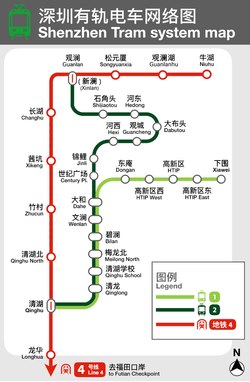Shenzhen Tram
| Shenzhen Tram | |||
|---|---|---|---|
 | |||
 | |||
| Overview | |||
| Locale | Shenzhen, China | ||
| Transit type | Tram | ||
| Number of lines | 2 | ||
| Number of stations | 21 | ||
| Website | http://www.szlhtram.com | ||
| Operation | |||
| Began operation | 28 October 2017 | ||
| Operator(s) | Shenzhen Metro | ||
| Technical | |||
| System length | 11.7 km (7.3 mi) | ||
| |||

Shenzhen Tram is a light rail system consisting of two (formerly three) tram routes in Longhua District, Shenzhen, Guangdong, China. Construction commenced on 27 December 2013[1][2] and public testing started on 30 June 2017,[3] with the system fully opening on 28 October 2017.[4] The tram system integrates the north side of Longhua into the city's rail network and is expected to significantly ease commuting difficulties.
The initial system consists of 11.7 km (7.3 mi) and three lines. The tram links Qinghu Station on Line 4 of the Shenzhen Metro with central Guanlan, with service to Longhua areas including Automobile Industry City, Guanlan Strategic New Industries Park and the Science and Technology Service Center. It will eventually connect with Shenzhen Metro Line 4 at Xinlan Station. There are 21 stations, constructed at a cost of about 1.38 billion yuan (US$226 million). It is expected to help residents commute and relieve traffic congestion in the local area.[5][6][7] A 3.8-kilometre (2.4 mi) spur links Guanlan New Industry Park with Dahe Road. The spur is expected to cost 218 million yuan.
Lines
[edit]There are 2 lines in operation; line 1 (Qinghu – Xiawei) & Line 2 (Qinghu – Xinlan). Lines 1 and 2 share tracks between Qinghu and Dahe, where they branch off. Line 3 formerly connected Xiawei with Xinlan, passengers travelling between Xiawei and Xinlan are now required to transfer at Dahe for a connection.
Services formerly ran at a 20-minute frequency on each of Line 1, Line 2 and Line 3 with the parallel section between Qinghu and Dahe receiving a 10-minute frequency. To meet demand, services on Line 3 were withdrawn on 27 December 2017, and a 12-minute frequency was provided on Line 1 and Line 2, with a 6-minute frequency on the parallel section as these flows accounted for 94% of the demand. This provided an 87% increase in transport capacity.[8] From 28 June 2018, an 8-minute frequency is applied on Line 1 and Line 2, with a 4-minute interval on the parallel section to meet increasing demand during peak hours. To meet the desired density, all the trams are put into service, the first in railway transport industry.[9]
Rolling stock
[edit]Rolling stock consists of 4 section trams constructed by CRRC Zhuzhou Locomotive, using technology from Siemens.[11] The system does not use overhead wires, with trams recharging an onboard capacitor from fixed power bars above the tracks at each stop.
Discussion
[edit]Zhao Pinglin, deputy director of Shenzhen Rail Construction Headquarters, said tram systems have shorter, cheaper construction periods than metro and light rail. Modern tram systems also have lower energy consumption, more flexibility and quieter operations, Zhao said. Longhua is planning three tram lines totaling 51 kilometers. Construction of metro projects can take four to five years and cost 600–700 million yuan per kilometer, while tram lines can cost about 100 million yuan per kilometer and be used for 30 years. The tram has been criticized for roughly following the path of the north extension of Shenzhen Metro Line 4 rendering the project redundant.[12] However, given that the goal of the tram project was to improve short distance transport and serve as a feeder line to the metro, the tram project will complement the Metro extension rather than compete with it.
References
[edit]- ^ "Tram work starts in Longhua New Area---szdaily多媒体数字报刊平台". szdaily.sznews.com. Archived from the original on 2013-12-31.
- ^ "New tramways for 2015 - The International Light Rail Magazine". The International Light Rail Magazine. 2015-02-11. Retrieved 2018-05-05.
- ^ 李注. "一路繁花似锦!深圳首条有轨电车示范线试运行_深圳新闻_南方网". sz.southcn.com. Retrieved 2017-07-09.
- ^ "有轨电车将在28日开通迎客-深 圳 区-地铁族". www.ditiezu.com. Retrieved 2017-10-29.
- ^ "深圳龙华现代有轨电车年底示范线通车 - 深视新闻 - 城市联合网络电视台". www.cutv.com. Retrieved 2016-06-12.
- ^ "龙华有轨电车实行一票制 票价为2元一人". 22 June 2017.
- ^ "龙华有轨电车预计6月30日试运营 改善片区交通". 11 June 2017.
- ^ 深圳地铁. "没错,就是明天!龙华有轨电车本周将压缩行车间隔". Retrieved 2018-02-05.
- ^ 深圳地铁. "好消息!龙华有轨电车明日起第三次压缩行车间隔啦!". Retrieved 2018-06-27.
- ^ "颜值超高!深圳的有轨电车长这样!真车到了……". www.sohu.com. Retrieved 2017-07-12.
- ^ "100% low-floor Tram" (PDF). Siemens AG. 2017. Retrieved 2018-05-06.
- ^ "深圳首条"有轨电车"再起争议_资讯频道_凤凰网". news.ifeng.com. Retrieved 2017-07-09.



